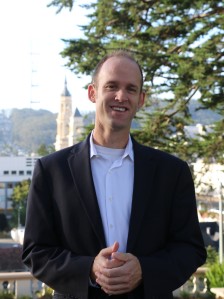Elizabeth Silva
Staff Writer

Corey Cook, director of the Leo McCarthy Center and associate politics professor, agreed to share his thoughts on the upcoming Nov. 4 election with the Foghorn. Cook said that the state ballot may not be particularly exciting, but there are some interesting propositions and candidates on the local ballot.
Several people are running for office both locally and statewide, including Gov. Jerry Brown, Attorney General Kamala Harris, five of the eleven Board of Supervisors, and Supervisor and President of the Board David Chiu and Supervisor David Campos are running against each other for the 17th Assembly seat.
“City-wide there are a handful of ballot measures that are pretty significant and hotly contested local races, particularly District 10, which is Bayview, Vis[itacion] Valley, and Potrero Hill, and the assembly district for the Chiu-Campos race,” said Cook. “There are quite a few things that people are looking at locally, but not so much state-wide. There are some very expensive ballot measures, but in terms of candidate races, they’re not going to be particularly competitive.”
The American Beverage Association has spent $7.7 million attempting to defeat the soda tax, or Proposition E, in San Francisco, according to SF Gate’s website.
One of the main reasons that the statewide candidate races are not particularly competitive is because there are a lot of Democrats running for re-election in a state where Democrats control every statewide elective office in two-thirds of the state legislature.
Brown is up for re-election, but he has not led a highly advertised campaign against Republican gubernatorial candidate Neel Kashkari.
In contrast, Kashkari has taken steps to advertise his candidacy. He has run ads, some of which were considered controversial, including one in which he was saving a drowning child. He also posed as a homeless person for a week in Fresno to gain the media’s attention
LOCAL PROPOSITIONS
Cook predicts that there will be a low turnout next month because there are not any socially divisive issues on the ballot and that voters are frustrated with national issues and are focused on Washington. There is a sense of disgust with politics and because the election is somewhat noncompetitive, people are not going to vote.
There are some propositions on the local ballot that are interesting to San Franciscans, however. Cook mentioned that whenever he is on a panel, the audience wants to talk about the propositions and the local issues.
Proposition E, otherwise known as the soda tax, would increase the price of sugary beverages by two cents per ounce. The money from the tax would go to San Francisco Unified School District for nutrition classes, the Department of Public Health and the Public Utilities Commission for healthy food initiatives, to the Recreation and Park Department for sports programs, and to community-based groups.
“It’s [soda tax] never been passed in a jurisdiction locally,” said Cook. “It’s on the ballot in San Francisco and Berkeley. This is the census. If it is defeated in San Francisco and Berkeley then other jurisdictions won’t even try, so it’s a hotly contested issue.”
The soda tax is a special tax, however. It needs two-thirds of the vote to pass. Cook has no doubt that it will receive fifty percent of the vote, but whether it gets two-thirds of the vote is another question.
“I will be very surprised if it doesn’t get a majority of the vote,” shared Cook.
Another hotly contested issue is Proposition G, which is about real estate anti-speculation. The proposition would stop speculation in home sales and would make it more difficult and expensive for people to flip properties by applying a surtax that only applies to corporations, LLCs and investors who buy and sell multi-unit apartment buildings in less than five years.
Cook described it as a transfer tax that would apply to about 60 buildings per year according to the City controller. It is not a widespread measure and it does not impact current homeowners at all or people who buy a home and live in it.
“It’s actually a very narrowly tailored piece of legislation designed to target residential speculators,” said Cook. “The City estimates very little revenue from the tax. Its goal is stop residential speculation and flipping.”
The issues that will have the most impact if they were to pass, according to Cook, are the minimum wage raise, Proposition E, Proposition G, and the renewal of the Children’s Fund and Education Fund.
Cook believes Proposition G to be a symbolic statement towards a critically important issue. He does not believe that it will help immediately make the City more affordable, but is a step towards addressing affordability and preventing a certain type of speculation.
The minimum wage increase would be the first and most impactful proposition. Next, Cook believes the soda tax would make an impact because “two cents an ounce is a fairly significant tax increase.” Finally, the Public Education Fund and the Children’s Fund, which is likely to be renewed to provide after-school programs, youth programs and training, would work across agencies to help youth and their families.
Look for more predictions from Corey Cook in the next issue.
